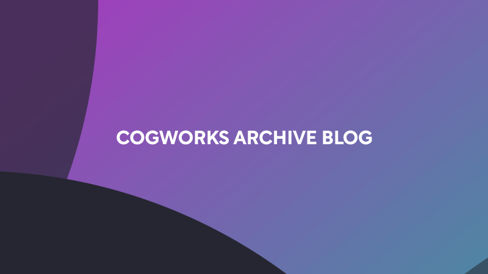We have been adding side projects to our process for many years to improve our knowledge and become better at what we love. These projects can be personal or with others, and having the choice to pick leads to lots of new ideas!
Hello, youve stumbled into the old Cogblog archives
We've switched our blogging focus to our new Innerworks content, where tech community members can share inspiring stories, content, and top tips. Because of this, old Cogworks blogs will soon be deleted from the site, so enjoy it while you can. A few of these might refer to images in the text, but those have been deleted already sorry. Some of these subjects will return, some aren't relevant anymore, and some just don't fit the unbiased community initiative of Innerworks.
If you'd like to take on this subject yourself please submit a new blog!
Farewell Cogworks Blog 💚
For a few years now, Cogworks has been using time at work for side projects. (No, not launching a bakery, though if you follow us on socials, you'll know we had a stint with making purple beans and designing for a Vegan Bakery specialising in pet cakes).
Joking aside, for two days each month, we use this time to address gaps in our professional knowledge and become more wonderful at what we love!
Away from side projects, a "typical" day at Cogworks will include a cycle of analysis and improvement, but our side projects tend to direct us off the beaten track and into the wilderness.
Projects generally intertwine with the company values and benefit personal or company growth in some way. Referring back to Cogworks values, it always helps to manifest a side-project idea that will be beneficial. We've shared a little on our values lately, but the entire collection is as follows:
WorkHome
WorkHard
WorkWell
WorkBrave
WorkCreative
Why are side projects part of our process?
Our strategists, designers and developers are getting creative, addressing gripes with logical solutions and building self-confidence. Projects range from personal endeavours to collective ones, and the freedom to choose influences our ideas. Here are a few of our latest ventures.
1. The maintenance dashboard.
Team: development.
Building APIs allow us to get creative and, in this case, stay organised!
The maintenance dashboard built by frontend developer Wojciech Krzysztofik is a simple idea that greatly helps! The dashboard identifies packages within a project, the versions of those packages, and the latest ones available.
It uses GitHub API to fetch a list of Umbraco-based projects. The Tech stack behind the app is express.js, Heroku and Next.js, which helps us get a real-time view of where we are and where we can be.
2. Cogworks Essentials.
We're excited to bring developers a range of Cogworks packages to use on different projects. Each package is essentially an intuitive kit that will help developers get started without the fuss.
We're still adding to them, but feel free to check our kit for .NET development projects on GitHub.
3. Cogworks Azure Search.
This package comes from our drive to continuously improve and automate processes to deliver high-quality solutions.
We use Azure and Azure Search on many of our client projects. This addition to our package family will help create a single convention for "talking" with the search service, making project setups even easier.
Technically speaking, the package is a wrapper to Azure Search, which allows the easy set-setupAzure Search indexes and searchers and can be used with the DI/IoC approach (currently with support for Umbraco LightInject and Autofac).
Our open-source creation is available for download on Nuget.org and GitHub.
4. The process clean-up.
Team: Strategy.
We cast our eye over our daily project management tool, Trello, and noticed we were drowning in unnecessary boards! A thorough spring clean and reorganisation of boards prompted a deeper look into our processes.
Find out how we re-vamped our Trello board and how it transformed our work!
6. Automations.
Team: Development.
Developer Adrian is working on a few automation projects at the moment. Pictured above is the Cogworks Automation for GitFlow, the automation that is helping the team control incremental releases and produce changelogs, which we share with our clients. He has also produced automation that looks after our code standards (letting us monitor things locally and on CI/CD builds).
7. Public speaking.
Team: Strategy
Project Manager Kasira formed an idea from her own experience. She noticed there was room for improvement in communication and confidence when public speaking at work. We're often taking the stage at conferences like the Umbraco festival, so POM (presentation of the month) was introduced as a fun exercise to become better speakers and get to know each other better. The idea is to chat about any subject of choice. So far, we've lightheartedly covered a few topics, including 'an introduction to my "unhealthy" obsession with crips'.
8. The blog.
While our time is a chance to develop strategies, we must share our thoughts and what we know through our blog. The blog is also for developers, designers, and co-founders to gather accurate insights from their years of experience in the industry.
What's next?
Every month, we work on something new.
Sharing our insights internally and externally wherever we can is what we're all about (it's all part of why we love open-source CMS projects and communities like Umbraco, where contributions and ideas are always encouraged).
That's why side projects are part of our process!
Did you know that Gmail is the outcome of a side-project initiative too?
- open source
- azure devOps
- Azure
- project management
- automation
- side-project
- agile
- workflow

Innerworks and Cogworks are proud to partner with Community TechAid who aim to enable sustainable access to technology and skills needed to ensure digital inclusion for all. Any support you can give is hugely appreciated.
